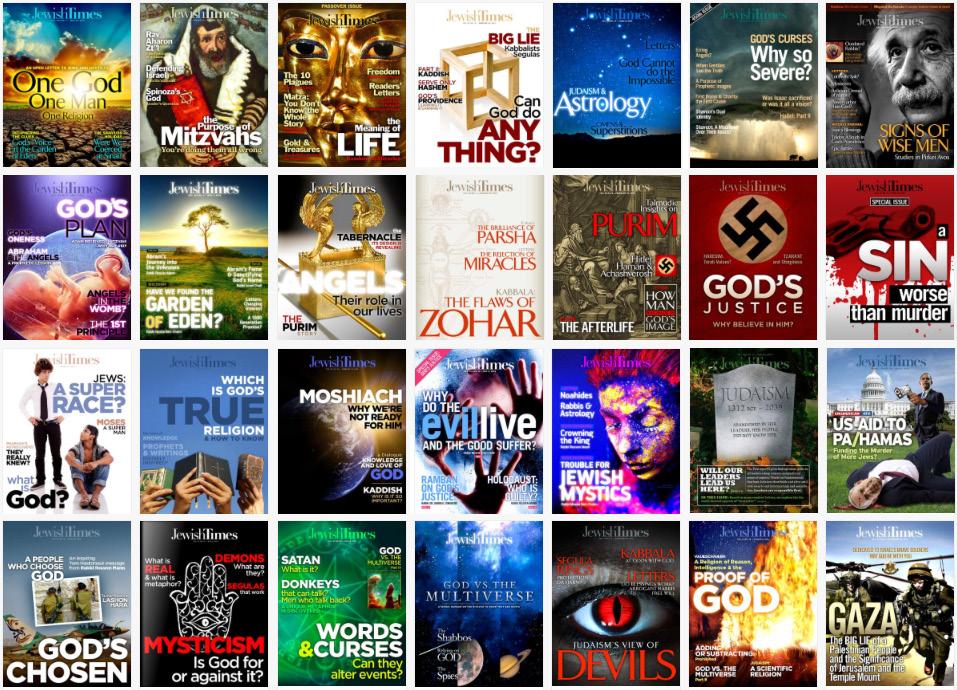
GOD, JEWS & ISRAEL
















| Please send letters and questions to: Comment@Mesora.org |
LETTERS
Can we ever stop our Torah study?
RABBI MOSHE BEN-CHAIM
A religion based on reason and proof exposes what lacks in all others
RABBI REUVEN MANN
God’s relationship with the Jews is eternal
RABBI MOSHE BEN-CHAIM
Maimonides’ precise formulations teach that this law contains more than we think

Exactly. Following God’s will earns us supernatural providence. Observing Shmi a means the land lays fallow. Yet God says He will make the sixth year’s produce three times natural yield. God says the same regarding charity (Malachi 3). Our natural calculations worry us: not working the land and giving char y diminish our wealth. God assures us His providence will override nature, when we follow Him.


READER: Does the Rambam hold there is a constant obligation of Torah study? One of my teachers says he does, but can be exempted when works needs tom be done. But when I look at the Rambam, I don't see it. In hilchos Talmud Torah 1:8 he seems to pasken like Rabbi Shimon bar Yochai in menachos that learning must take place day and night, not constant. Chapter 3 extols


constant learning but that doesn't seem obligatory; the keter (crown) Torah is for one who wants to fulfill the mitzvot in the ideal form, but not an obligation. "Ki Devar Hashem Bazah", Rambam says is when one can learn but doesn't, but possibly he holds like the MaHarsha on that gemara in Sanhedrin that it only applies if you are doing meaningless activities, but doesn't necessarily mean you have to be learning all the time. The only thing I can think of is the prohibition of forgetting Torah which occurs as long as one is not learning, so perhaps that implies a constant need to learn. Rabbeim also say there is an obligation to know kol hatorah kulah, but I don't see that in the Rambam - as he says, “The work is not upon you to complete at all.” –Alex Kahgan
RABBI: In hilchos Talmud Torah 3:4 Rambam says, “If a mitzvah comes along and others can address it, you should not suspend your Torah study. But if there's no one else around, then you should fill the mitzvah and then return to your study.” This is because Torah study is the greatest of all commandments. In 3:6 he says, “One should not direct his thoughts to other matters,” and “A person is not free to abandon his studies.”
It appears Torah study is constantly obligatory. But even this is not the highest level. The highest level is where a person loves his Torah study; he

does not view it as an obligation. He finds all else in life a distraction, although at times necessary distractions. Rambam makes it clear that the person is prohibited from relying on charity to support himself, but he must work. He gives an outline of working three hours a day and engaging in Torah study nine hours a day. Once a person reaches a certain level, he finds Torah study the greatest joy, as King David said, it was his “plaything.” He no longer thinks about any “obligation” to study Torah, in the same manner as a person does not look at a long awaited vacation as an obligation.
Every Jewish man is obligated to study Torah, whether he is poor or rich, whether his body is healthy and whole or a icted by di culties, whether he is young or an old man whose strength has diminished. Even if he is a poor man who derives his livelihood from charity and begs from door to door, even if he is a husband and [a father of] children, he must establish a fixed time for Torah study during the day and at night, as [Joshua 1:8] commands: "You shall think about it day and night." (Ibid. 1:8)
It is interesting that the Torah verse obligating one in Torah study mentions “day and night.” What is this lesson? This teaches that Torah study di ers from all other commands. Other commands are discreet actions. But Torah study is an ongoing involvement. ■


Religion refers to a lifestyle of submission to a benevolent and ultimately superior being, a lifestyle designed and transmitted by that authority. All religions except Judaism claiming to be God’s only true religion lack validation. Judaism is the only religion with proof of Divine origin. This proof is demonstrated through God’s revelation of His existence and His communication to 2.5 million Jews on Mount Sinai 3336 years ago. The Jews witnessed an intelligent voice speaking from within the fiery mountain. Biological or earthbound life cannot exist in fire, precisely why God used fire in this event. No other religion makes such a claim to possess proof via mass witnesses, because Divine revelation never happened to others, and as Torah (Bible) says, “It will never happen again” (Deut. 4:32-34).
Judaism is the only religion whose claim is supported by world acceptance of Torah. This acceptance is a 100% proof of God’s revelation to the Jewish people. Had Revelation at Sinai never occurred, it would not have been believed by that generation, and certainly not the rest of the world and all future generations. Had Revelation at Sinai never occurred, Moses would have failed completely to convince the Jews that they witnessed miracles, when they had not. The only way Revelation at Sinai became accepted is because it was witnessed, and then all witnesses passed down the identical story to the following generations through today. God wished that this event remain a 100% proof throughout all generations. Had a false prophet attempted to convince any group that they witnessed what they had not, they would never accept him, nor would they replace their known history with the false prophet’s lies. A unanimous identical transmission of a witnessed event occurs only when that event occurred. Unanimous transmission—a single Biblical account—is proof of the truth of Revelation at Sinai. God revealed Himself to masses only once: to the Jews on Mt. Sinai, where He gave the Jews His Bible. Bible also shares precise lineage, tribes, families and
RABBI MOSHE BEN-CHAIMnames, lifespans, and travels. Had the Bible been false, Jews would not communicate such detail.
All other religions are founded on a single person’s claim (or a fabricated story) that God communicated with him. Something of this nature cannot be proven, and is precisely why they formulated their religions with the demand for “blind faith.” Those religions did spread, but not due to witnessed events. Those religions spread as they appealed to human emotions, and also through coercion. People will accept what is pleasing; someone dying for my sins is very appealing. Praying to a tangible human is more pleasing than praying to an invisible and abstract God. But not one other religion can provide evidence of Divine origin to their religions. Therefore, there is no basis to accept their religions. Furthermore, as God designed only one human being, multiple religions is nonsensical. Just as all people are treated identically for cancer, all people will find the happiest life with the same religious system. We are all identical: biologically and psychologically.
Judaism is also unique in its intellectual and brilliant design, in its basis in reason and proof, and in its full compliance with human nature, o ering real happiness and no conflicts. Judaism is founded on principles which are rational and comply with man’s nature as a philosophical and psychological being. Not one law in all of Judaism goes against man’s nature. Unlike Catholicism which frowns upon divorce and praises celibacy, Judaism embraces the need at times for couples to divorce if they will be happier that way, and Judaism also embraces man’s need for sexual happiness and children. These are just two examples of how Judaism approaches life honestly. Catholicism makes man into a mystical and infallible saint or an angel, one who is above actual human drives and emotions. This opposes reality. Judaism accepts that man’s happiness must stem from his being in line with his nature. And Judaism doesn’t hide our leaders’ sins. We have no saints, all men sin: “For man is not
wholly righteous on Earth who does what is good and doesn’t err” (Koheles 7:20).
Judaism realizes that besides man satisfying his psychological needs, he has a much higher part which must be addressed: his soul. By man ignoring this essential part of his nature, he will never reach his ultimate, Divine mission of approaching God. Man achieves this mission and ultimate happiness by his immersion in study of creation and Torah, actualizing his true goal and purpose in an appreciation of the Creator. Torah, Prophets and Writings, along with the Talmud, were written in a highly stylized format which takes years to master. Their style is such, that as one delves deeper and deeper, he or she finds more profound ideas. This analysis and search satisfies man in its very process, as well as through enlightenment of new insights. As God possesses all wisdom, man will always see new insights, provided he has toiled under the tutelage of those before him trained in the method of Talmudic and Biblical exegesis, teamed with the essential modes of interpretations only found in the Oral Law, which God also communicated to Moses on Sinai.
The system of Jewish law—halacha—is also a major component of Judaism. It guides man’s every action from waking and prayers, to blessings over food, ethical and moral conduct, business practices, social relationships, and holidays. All areas of life are always placed in check as man judges each of his actions for Torah compliance prior to commencement. This process engages man’s mind throughout his days when he is not involved in study, which must comprise the majority of his waking hours.
In truth, there is no comparison between the Divinely designed system of Judaism and man made religions for the precise reason that there is no comparison between God and man: man made all other religions. God made Judaism, Bible. This of course is a very small glimpse into Judaism. A more encompassing appreciation of God's wisdom is only possible through much more study. ■




This causes him to be humble and not feel superior to anyone. He also realizes the extent to which Hashem cares about the needy and desperate citizens, and even the animals, and he is inspired to be generous in opening the gates of his property and allowing everyone in. This requires that one let go of his attachment to his possessions, which helps to free him from his dependency on “things.”
There is another dimension to Shemitah. Most people would be surprised that the farmer has been granted such an extended vacation. But is that truly such a good thing? Idleness can be dangerous if it prompts a person to waste his time on non-productive activities that don’t elevate him to a higher level. Extended vacations can cause a person to become immersed in various diversions that appeal to his baser instincts and tastes. Chazal extol the virtue of “Torah Im Derech Eretz” (Torah study combined with an occupation) neither of which appears to be present in the Torah’s Shemitah program.
However, the real benefit of the Shemitah year is that it a ords a person the opportunity to “seek out Hashem” by studying His Torah and practicing good and charitable deeds. The main purpose of the weekly Shabbat, by restricting labor and business activity, is to give a person the opportunity to focus on the study of Torah ideas. Rabbi Yosef Dov Soloveitchik goes so far as to say that one who scrupulously avoids all prohibited activities on the Shabbat but fails to devote any e ort to Torah study is akin to one who desecrates that holy day. (Harerei Kedem on Matters of the Shabbat, Siman 88)
Man’s need to perfect himself and reach the goal for which he was brought into existence is built into the creation. Shabbat is a unique institution which was designed to provide humans with the opportunity to exit the world of necessity and enter into G-d’s domain to luxuriate in the Divine Presence. This can be a transformative experience or in contemporary lingo, a game changer.
Virtually all peoples and cultures have adopted the seven-day week, even though there are no cosmic events corresponding to it, as in the case with the phenomena of the month or year. There is also universal recognition that one day each week should be set aside as a “Day of Rest.”
[The Christians observe their “Sabbath” on Sunday and the Muslims celebrate theirs on Friday–which is not in accordance with the Torah, which clearly states that “G-d created the world in six days and ‘rested’ on the seventh day; therefore, Hashem blessed the seventh day and sanctified it” (The Decalogue, Shemot 20:10). To me, this seems ironic. The only reason you keep a seven-day week and observe a Sabbath is because it is mandated in the Torah. If so,
why not do it properly and make Shabbat at the appropriate time, Saturday? Or would that be too much of an acknowledgment that the “Jewish” Torah is the real Word of G-d?]
From the words of the Rambam in the Moreh Nevuchim (Guide for the Perplexed) it seems that Gentiles as well as Jews are enjoined to sanctify the Sabbath. That is because observance of this unique day proclaims one’s faith that Hashem Created the world and ‘rested’ on the seventh day. If mankind were to honor the Shabbat, it would unite us all in the fundamental Doctrine of Creation. Aside from the purely religious benefits of this belief, its universal adoption would promote mutual respect among all people and implicitly a rm that we have all been created in the Image of G-d.
The Rambam states in The Guide (Book II CH XXXI {2:31}) :
Therefore we are told in the Torah to elevate this day (i.e. Shabbat); with the purpose of establishing thereby the Principle of Creation which will spread in the world, when all people keep the Sabbath on the same day. For when they ask why this is done, the answer is given: ‘For in six days the Lord hath made, etc.”(Shemot 20:10).
The Principle of Creation is so important that it manifests itself in the weekly Sabbath, in the Shemitah, which is the seventh year, and in the Yoveil (Jubilee) which is the fiftieth year after the conclusion of seven Shemitah cycles. This indicates that the conduct of all aspects of our economic life as well as our merciful and considerate treatment of others is rooted in the realization that we are all beings who have been created in the Divine Image and must reflect Hashem’s Infinite Wisdom and Compassion in all that we do.
The Doctrine of Creation has great practical significance for the ultimate redemption of mankind. At the outset of his Biblical commentary (Bereishit 1:1), Rashi asks why the Torah begins with the Creation narrative rather than with the details of the first Mitzvah He communicated to the Jews, i.e. the declaration of the New Moon. (Shemot 12:2) He answers:
“He conveyed the power of His works to His People in order to give them the inheritance of nations” (Psalms 111:6). So that if the nations of the world were to say to Israel, ‘You are thieves, for you have taken by force the lands of the seven nations,” Israel will respond to them, “All the earth belongs to G-d. He Created it and Gave it to whomever He saw fit. It was His Will to give it to them (the seven nations) and it was His Will to take it from them and give it to us.”
(CONT. ON NEXT PAGE)
Today, the Jew-hating people accuse us of stealing lands which they claim belong to them. The best response is the true one, that Hashem promised the land to the Patriarchs and delivered it to their descendants, the Jewish People, after them. The enemies of Israel delude themselves into thinking that G-d has rejected the Jews, and therefore all the promises He made to them are no longer valid. This is a falsification of Hashem’s words, which we must be vehemently refuted.
The Rambam in his famous “Iggeret Teiman” (Letter to the Jews of Yemen) says:
We are in possession of the divine assurance that Israel is indestructible and imperishable, and will always continue to be a preeminent community. As it is impossible for G-d to cease to exist, so is Israel’s destruction and disappearance from the world unthinkable, as we read, “For I the Lord change not; and you, the Sons of Jacob, will not be consumed” (Malachi 3:6).
Similarly, He has avowed and assured us that it is unimaginable that He will reject us completely, even if we disobey Him and disregard His commands, as the prophet Jeremiah avers:
Thus says the Lord: “If Heaven can be measured, and the foundations of the earth searched out beneath; then will I also cast o all the seed of Israel for all they have done” says the Lord (Jeremiah 31:36).
Indeed, this very promise has already been given before through Moses our teacher who says:
And yet for all that, when they are in the land of their enemies, I will not reject them, neither will I abhor them, to destroy them utterly, and to break My covenant with them; for I am the Lord their G-d (Leviticus 26:44).
Hashem’s covenant with the Jews cannot be annulled. Israel is the eternal People of G-d and His gift to them of Eretz Yisrael will never expire. He exiled His People from the holy land because of their sins, with the understanding that no other nation would be able to cultivate its soil. So it remained in utter desolation for thousands of years, waiting for its legitimate owners to return. And now the land is built up, its deserts bloom and its authentic inhabitants live in prosperity. May Hashem grant peace to His Nation Israel.
Shabbat Shalom. ■




Inhis heading of “Laws of Torah Study”, Maimonides formulates the law as 2 positive commands:
1) to study Torah
2) to honor Torah’s teachers and those who know Torah
It is then strange that in his commencing law 1:1 he begins with those who are exempt from Torah study, as opposed to starting with those who are obligated, as he does regarding Prayer: “It is a positive Torah commandment to pray every day” (Prayer 1:1). But Laws of Torah Study 1:1 reads as follows:
Women, slaves, and minors are free from the obligation of Torah study. Nevertheless, a father is obligated to teach his son Torah while he is a minor, as it states, “And you shall teach them to your sons to speak about them” (Deut. 11:19).
Rabbi Reuven Mann answered: “Learning and teaching Torah are not 2 separate mitzvot, but the obligation to teach is part of the very mitzvah of Talmud Torah.” Maimonides says this:
It is a mitzvah for each and every wise man to teach all students, even though they are not his children (Talmud Torah 1:2).
In 1:1 Maimonides prioritizes the teaching element over Torah Study itself, as perpetuating Torah is the true goal of Torah Study. Torah is not just for “me,” but for “mankind.” Torah study finds its objective in the greatest good, and that is only when the most people benefit. Teaching is then the focal point of Torah study. But it is not only to reach the greater quantity of people, but the quality of Torah must be cared for:
If a person wants to study Torah and he has a son whom he should teach Torah, his [study] takes priority over [that of] his son. If his son is wiser and a more creative thinker and thus capable of understanding what he studies more than he [himself], his son is given priority. (Ibid. 1:4)
Torah teachers must take this lesson to heart: we must be deeply careful to present Torah in a beautiful manner, where we share beautiful concepts and make them clear to our students. We should not give simplistic or mediocre explanations for any part of Torah, as God is not simplistic or mediocre. But we must diligently study and search for brilliance, and only then teach. Otherwise, keep it “under your tongue.” We are not to teach Torah to hear our voices. We are to teach Torah in a manner where the ideas amaze our students, and nothing less.

Later in 1:8 Maimonides then addresses one’s personal Torah study:
Every Jewish man is obligated to study Torah, whether he is poor or rich, whether his body is healthy and whole or a icted by di culties, whether he is young or an old man whose strength has diminished. Even if he is a poor man who derives his livelihood from charity and begs from door to door, even if he is a husband and [a father of] children, he must establish a fixed time for Torah study during the day and at night, as [Joshua 1:8] commands: "You shall think about it day and night." (Ibid. 1:8)
It is interesting that the Torah verse obligating one in Torah study mentions “day and night.” What is this lesson? This teaches that Torah study di ers from all other commands. Other commands are discreet actions which terminate. But Torah study is an ongoing involvement. It’s not a discreet act, but a lifestyle. Torah is to occupy our minds “day and night,” a duration. The Torah verse in Joshua is perfect, and makes this clear. This is an essential lesson. Another benefit of focusing on Torah throughout the day and night is that Torah’s very design requires sustained thought and consideration, to uncover its mysteries and deep, beautiful concepts.

Finally, what is Maimonides’ second element of this mitzvah, “To honor Torah’s teachers and those who know Torah”? How does this form part of the mitzvah of Torah study?
Just as a person is commanded to honor his father and hold him in awe, so, too, is he obligated to honor his [Torah] teacher and hold him in awe. The measure of honor and awe due one's teacher exceeds that due one's father. [For] his father brings him into the life of this world, while his teacher, who teaches him wisdom, brings him into the life of the world to come.

There is no greater honor than that due a teacher, and no greater awe than that due a teacher. Our Sages declared, “Your fear of your teacher should be equivalent to your fear of Heaven.” Therefore, they said, “Whoever disputes the authority of his teacher is considered as if he revolts against the Divine Presence.”
Torah study cannot be separated from its teachers: the entity of Torah is its transmission by teachers. To perpetuate Torah, we maintain great honor for teachers, and this exalted status we maintain helps teachers be respected and received by the nation. It helps spread Torah. ■







All books depict history, facts, theories, fiction or poetry. No book is coded with hidden messages beyond the words or patterns revealing marvels. But the Bible (Torah) was written by God, and is “coded.” The order of verses, use of certain phrases, apparent contradictions and other Biblical patterns are pur poseful clues to God’s wisdom.
This book unveils those patterns and shares the hidden messages.




